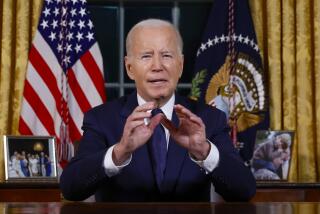Subverting Democracy for Power : We Are Weakened by Win-With-Any-Means Foreign Policy
The Iran- contra hearings raised a basic issue: Can a democracy be a superpower without compromising its domestic political principles?
There has always been a sharp split between those who believe that the cause of liberty is advanced by America’s pursuit of world power and those who believe that a foreign policy of restraint is essential to preserving constitutional government at home. The worst fears of the advocates of restraint have not been realized, but Vietnam, Watergate and the Iran-contra affair show that their concern is not misplaced. A foreign policy that seeks to transform the world may have the unwanted result of transforming America instead.
The Reagan Doctrine’s neoconservative apologists do not deny that the Administration ignored legal and constitutional norms and lied to Congress and the American people in the Iran-contra affair. On the contrary, they have tried to justify such actions by invoking the traditional defense of all who purport to be clear-eyed “realists”: The end justifies the means.
Backers of the Reagan Doctrine view world politics as a Manichaean struggle between freedom and communism, in which a communist victory anywhere is a defeat for democracy everywhere. They share Woodrow Wilson’s belief that America can be safe only in a world of like-minded states, and they believe that the United States is at war in all but name. To win, they say, a strong executive must be able to conduct diplomacy and covert actions unhampered by congressional or public oversight.
Impatient with the constitutional constraints, the defenders of the Reagan Doctrine mutter darkly about an alleged conflict between this country’s global responsibilities and its democratic system. They have embraced De Tocqueville’s indictment that “foreign policies demand scarcely any of those qualities which are peculiar to democracy (and) require, on the contrary, the perfect use of almost all those in which it is deficient.”
De Tocqueville’s observation cannot be dismissed out of hand. Realpolitik thinking is uncongenial to American political discourse, but the United States does not exist in isolation. It is a great power in an anarchic international system, and, like all nations, lives in the shadow of the perennial security dilemma. Potentially, American freedom can be dramatically affected by outside events, and there is a point at which the external environment can become so threatening that foreign policy must have priority over domestic policy. Thus in 1940-41 President Franklin D. Roosevelt was justified in acting without congressional or public approval to make the United States a de facto belligerent; a Nazi victory would have posed a clear and present danger to U.S. security. But those who would make foreign policy paramount bear a heavy burden of proof: Only an extraordinarily compelling end justifies a foreign policy whose means require that established political and constitutional processes be circumvented.
Most great powers in history have had little choice about either the objectives or the means of their foreign policies. The geographical proximity of threatening rivals, a geopolitical reality in Europe, necessarily defined security as their over-riding purpose and forced them to subordinate domestic objectives to the imperative of safety from external attack. The United States, however, has seldom been compelled to subordinate domestic concerns to its foreign-policy goals because for most of its history it has been relatively immune to external danger. Although generally unappreciated, America has regained much of this past invulnerability because of nuclear weapons, overwhelmingly superior military and economic capabilities in relation to all states save one, and--of course--geography.
In today’s world, few events abroad can affect America’s core security. The United States cannot be indifferent to overseas developments, but it can afford to react deliberately to them; this is a luxury denied to less powerful and less fortunate states. Yet the Reagan Doctrine’s obsessive concern with communist ideology (something quite different from Soviet power) has led its adherents to consciously choose a foreign policy that undermines America’s own political institutions--notwithstanding their recognition that America’s physical safety is not itself tangibly threatened.
Americans should look suspiciously on claims that national security justifies an executive’s end runs around Congress and the Constitution. A foreign policy that combines Bismarck’s cynicism with Wilson’s self-righteous zeal is a recipe for political and moral disaster. When an asserted hard-edged “realism” is blended with a messianic commitmentto defeating communism everywhere by whatever means, the result is a dangerous brew.
There is a sad and bitter irony in a foreign policy that, like the Reagan Doctrine, seeks to promote democracy abroad by subverting it at home.
More to Read
Get the L.A. Times Politics newsletter
Deeply reported insights into legislation, politics and policy from Sacramento, Washington and beyond. In your inbox three times per week.
You may occasionally receive promotional content from the Los Angeles Times.










